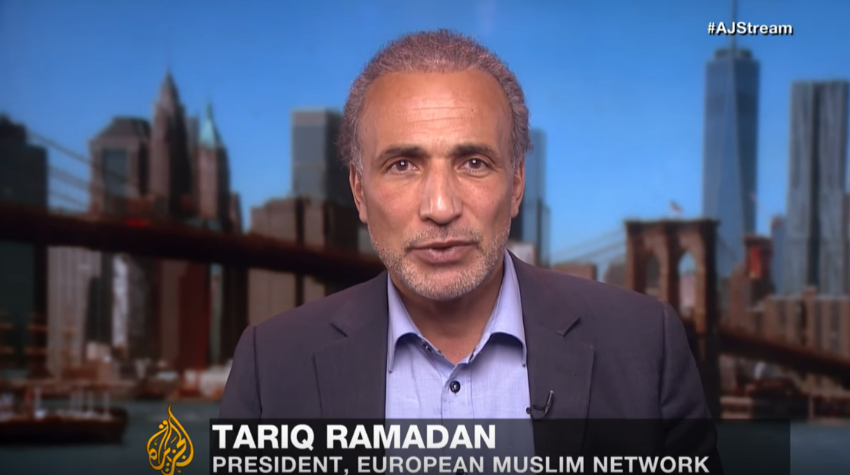(…)
Professor Tariq Ramadan has studied Islam at the University of Geneva and al-Azhar University in Cairo and is currently senior research fellow at St Antony’s College, Oxford. The Messenger is easily the most scholarly and knowledgeable of these four biographies of Muhammad, but it is also practical and relevant, drawing lessons from the Prophet’s life that are crucial for Muslims and non-Muslims alike. Ramadan makes it clear, for example, that Muhammad did not shun non-Muslims as ”unbelievers” but from the beginning co-operated with them in the pursuit of the common good. Islam was not a closed system at variance with other traditions. Muhammad insisted that relations between the different groups must be egalitarian. Even warfare must not obviate the primary duty of justice and respect.
When the Muslims were forced to leave Mecca because they were persecuted by the Meccan establishment, Ramadan shows, they had to adapt to the alien customs of their new home in Medina, where, for example, women enjoyed more freedom than in Mecca. The hijrah (”migration” ) was a test of intelligence; the emigrants had to recognise that some of their customs were cultural rather than Islamic, and had to learn foreign practices.
Ramadan also makes it clear that, in the Koran, jihad was not synonymous with ”holy war”. The verb jihada should rather be translated: ”making an effort”. The first time the word is used in the Koran, it signified a ”resistance to oppression” (25:26) that was intellectual and spiritual rather than militant. Muslims were required to oppose the lies and terror of those who were motivated solely by self-interest; they had to be patient and enduring. Only after the hijrah, when they encountered the enmity of Mecca, did the word jihad take connotations of self-defence and armed resistance in the face of military aggression. Even so, in mainstream Muslim tradition, the greatest jihad was not warfare but reform of one’s own society and heart; as Muhammad explained to one of his companions, the true jihad was an inner struggle against egotism.
The Koran teaches that, while warfare must be avoided whenever possible, it is sometimes necessary to resist humanity’s natural propensity to expansionism and oppression, which all too often seeks to obliterate the diversity and religious pluralism that is God’s will. If they do wage war, Muslims must behave ethically. ”Do not kill women, children and old people,” Abu Bakr, the first caliph, commanded his troops. ”Do not commit treacherous actions. Do not burn houses and cornfields.” Muslims must be especially careful not to destroy monasteries where Christian monks served God in prayer.
Ramadan could have devoted more time to such contentious issues as the veiling of women, polygamy and Muhammad’s treatment of some (though by no means all) of the Jewish tribes of Medina. But his account restores the balance that is so often lacking in western narratives. Muhammad was not a belligerent warrior. Ramadan shows that he constantly emphasised the importance of ”gentleness” (ar-rafiq), ”tolerance” (al-ana) and clemency (al-hilm).
It will be interesting to see how The Messenger is received. Ramadan is clearly addressing issues that inspire some Muslims to distort their religion. Western people often complain that they never hear from ”moderate” Muslims, but when such Muslims do speak out they are frequently dismissed as apologists and hagiographers. Until we all learn to approach one another with generosity and respect, we cannot hope for peace.
Karen Armstrong is the author of ”Muhammad: Prophet For Our Time”
Source : Financial Times



![PALEXPO : Democratic Engagement & Justice for Palestinians [08/07/2017]](https://tariqramadan.com/english/wp-content/uploads/sites/9/2017/07/Palexpo.png)
![Bristol Festival of Ideas : Conversation with Julian Baggini [24/05/2017]](https://tariqramadan.com/english/wp-content/uploads/sites/9/2017/06/bristol.png)
![Interview on BBC Radio Ulster [06/06/2017]](https://tariqramadan.com/english/wp-content/uploads/sites/9/2017/06/p03nnqlv.jpg)
![Interview on BBC 4 : What do the London attacks have to do with Islam? What is the Muslims’ responsibility?[06/06/2017]](https://tariqramadan.com/english/wp-content/uploads/sites/9/2017/06/bbc.jpg)


I doubt that anyone in the West will make sense of the spiritual condition of the Arab world without Adonis’ assistance
Thanks for this beautiful article, itself related to a beautiful biography of our Prophet (SAWS).
It is indeed with such acts of understanding and peacefull discussion that humanity progresses, and we achieve a better understanding of Allah’s Message.
Small steps along the path of Peace are rarely seen at their true value. So again, thank you for your just words.
I wish all the non-Muslims were thinking the way she does. These are difficult times for Muslims, so it is refreshing to see that not everyone is “hating” us because of some prejudices… Besides, there has never been as much converts as there are today, and I think that the Prophet’s life (saws) plays a major role in the path these converts choose.
Peace be upon you.